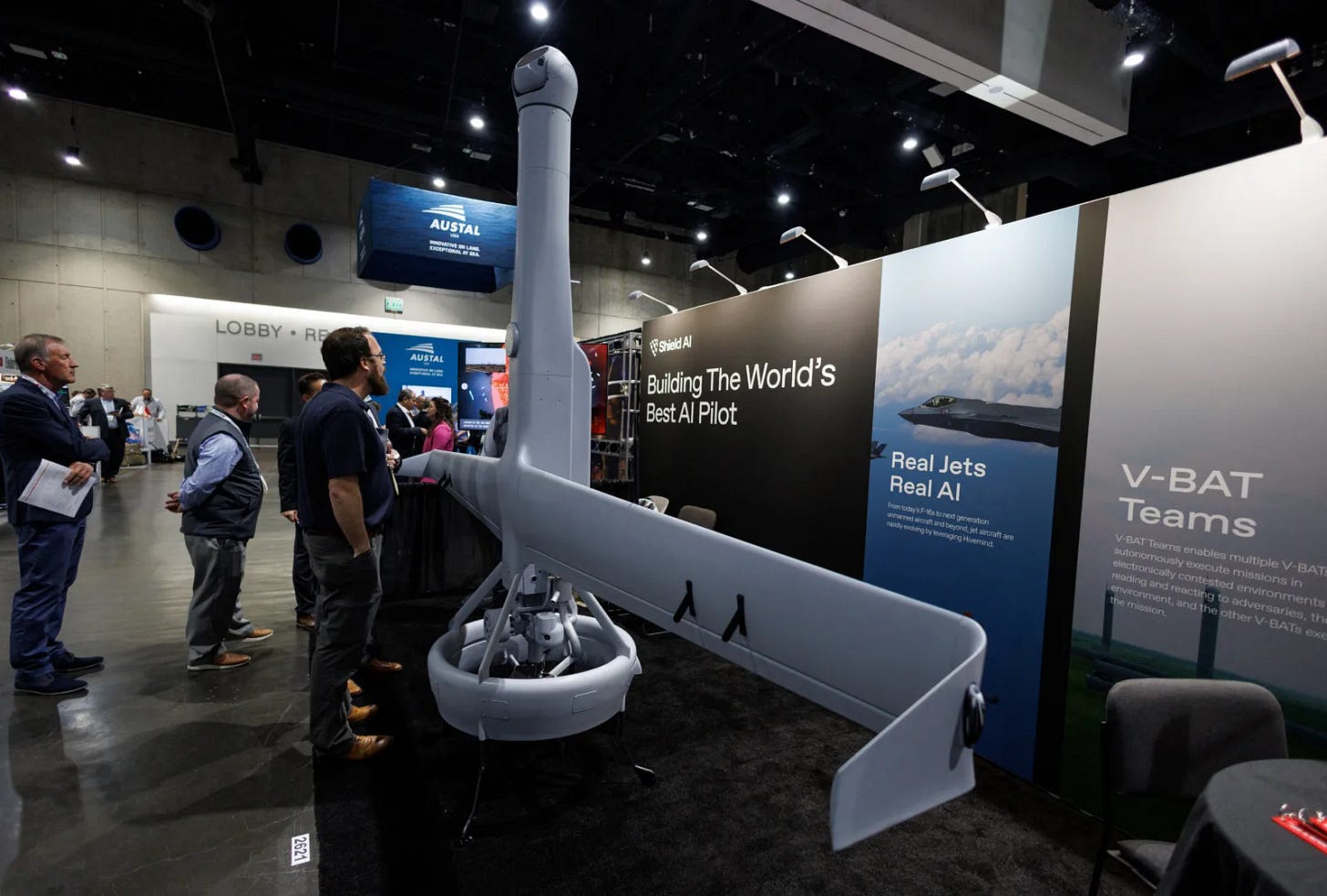Better Defense Through Technology?
How Venture Capitalists Seek to Remake the Future of Warfare
I have two new publications out today—a thirty-page policy brief and an op-ed in the New Republic— both co-authored with William Hartung, a great defense analyst and colleague.
We take up the subject of how Silicon Valley startups seek to secure new defense contracts for an age of “great-power competition” with China. Many of these defense startups are funded by venture capitalists who promote themselves as the facilitators of global peace. They promise that their technocratic knowledge and investments in artificial intelligence will deter Chinese aggression and reduce casualties on all sides in the event of a great-power war. If we are to save the world, they argue, the U.S. must have not just a technological advantage, but technological predominance over China and other U.S. rivals. Indeed, the CEO of Palantir (one of the largest defense startups), Alex Karp, recently declared at the AI Expo for National Competitiveness that “[t]he peace activists are war activists. “We are the peace activists.” Karp and like-minded venture capitalists are on a mission to make money while saving the world from China and Russia; they sell themselves as the “new Oppenheimers.”
Bill and I show that this line of thought is nothing new. Since World War I and the rise of “precision bombing,” American policymakers have been fascinated with the promise of technology to ameliorate the brutality of war—to create “clean” wars with minimal casualties. This “progressive” project created a public-private relationship between government and industry that led to the rise of Silicon Valley (which relied upon government dollars from the 1950s to the 1980s), the creation of the Apollo space program, and the development of the Strategic Defense Initiative (aka “Star Wars”) under President Ronald Reagan. Silicon Valley eschewed Pentagon contracts during the 2000s for fear of being associated with failed wars in Afghanistan and Iraq, but they are now back and ready to renew their relationship with the Department of Defense—the era of “endless war” supposedly behind us.
As I explain in my Twitter/X thread on the topic, these defense startups are a corollary to the era of defense consolidation in the 1990s and the decline of defense subcontractors. The emergence of the “Big Five”—Lockheed Martin, RTX (formerly Raytheon), Northrop Grumman, General Dynamics, and Boeing—meant that defense companies doubled down on large expensive weaponry and took fewer risks with experimental technology, risks that the defense startups are willing to undertake. More military subcontractors is not necessarily a bad thing given the problems with the defense industrial base—as I outlined in my Foreign Affairs article last year—but the Silicon Valley startups are promising Congress and the White House the earth, moon, sun, and stars when it comes to defense technology. Many of the developments in artificial intelligence that they claim will bring global peace are untested, flawed, or simply don’t exist yet.
Deputy Secretary of Defense Kathleen Hicks surprisingly announced the Replicator program last August with the goal of solidifying closer ties between Silicon Valley and the Department of Defense. Hicks claimed the Pentagon was making a “big bet” on artificial intelligence and defense startups to develop the battlefield technologies needed for the future of U.S. national security. But as Noah Robertson reported last year for Defense News, this "big bet” has yet to pay dividends:
Replicator is 20 months away from its deadline to field systems. So far, it hasn’t led companies to increase production, venture capitalists to make new investments nor members of Congress to help fund it. Many in these groups want Replicator to work. Some even say it must, or else the U.S. may fail to stop an invasion of Taiwan, which China considers a rogue province and has threatened to take back by force.
In our brief and op-ed, Bill and I encourage Congress and the White House not to become too infatuated with Silicon Valley and the promise of an “A.I. battlefield.” It remains to be seen if Silicon Valley startups will deliver on their promises. But if history can be instructive, it is unlikely. In the meantime, Congress must intervene to implement regulations on artificial intelligence to prevent misuse, fraud, and corruption. Senator Elizabeth Warren, among others, has sponsored legislation to prevent defense mergers, rein in defense consolidation, and put a stop to the "revolving door" between government officials who leave Congress or the White House to find lucrative work in the defense industry. Similar measures must be pursued to regulate the defense startups and the production and use of autonomous weapons.
For more on our findings and recommendations, read our policy brief here, and our op-ed here.



I think there's a reasonable argument for autonomy's relevance to the war in Ukraine. Jamming and other electronic warfare measures have decreased the efficacy of the traditional weapons you cite. There's a credible (beyond my [ability] to evaluate if true) argument that autonomy can overcome the ability to cut off communication with the UAVs and thus would make a big difference. Autonomy of course has a range of downsides and risks, but I do think it's relevant.
I forget if i've pitched this to you before, but I do think that modular open systems are an important concept for addressing some of your concerns: https://www.csis.org/analysis/readiness-open-systems-how-prepared-are-pentagon-and-defense-industry-coordinate
If there are open interfaces at critical junctures, it's a lot easier to allow for more competitors and the role of major primes focuses more on [system] integration and not vertical integration. But that requires government buying key portions of IP owning the tech baseline. It's a technologically complex challenge and a collective action problem, but it seems relevant to your critiques of the system.
[P.S. I'm always glad to see deeper engagement on acquisition issues from the progressive side, thanks for these pieces.]
Intriguing line of thought